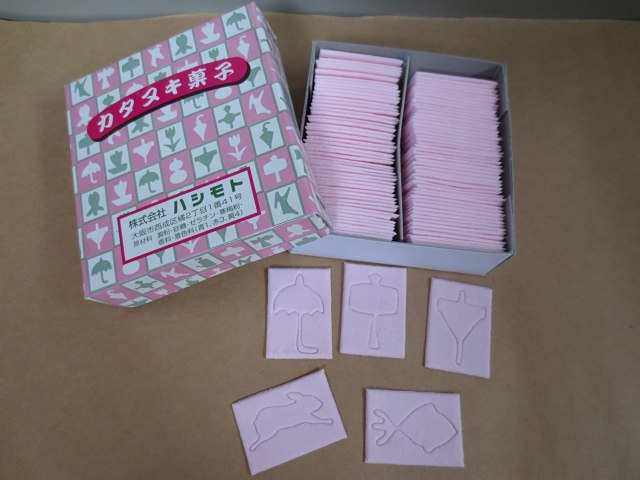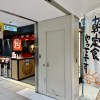
The only makers of katanuki pieces may have to close their doors forever if the pandemic continues much longer.
There all kinds of fun traditions associated with Japanese festivals, but one of the most popular for kids–besides the many food stalls selling sweets, of course–are the festival games, like the goldfish scoop, ring toss, and air rifle shooting. Children all over the country look forward to festivals so they can win prizes from the games.
But one beloved festival activity known as katanuki might not survive the pandemic. Why? Because the company that makes katanuki may be forced to close its doors if it goes on much longer.
Katanuki is a kind of contest of skill and patience. The game is played with small, fragile candy boards that have a picture carved into them, like flowers, daily objects or animals. The designs come in different levels of difficulty, and participants have to try to carefully cut out the picture with a small needle or pin without breaking it. If they succeed, they win a prize, and the higher the difficulty, the better the prize.
These candies, which are made with rice or potato flour, sugar, and food coloring, are mostly supplied by one small, family-owned company known as Hashimoto. They have been making katanuki candies since the 1960s, when they began selling them at kamishibai street theater performances. Though the advent of television meant the decline of kamishibai, Hashimoto weathered the change of times when other katanuki candy makers closed their businesses by selling their candies at street stalls, which soon led to a huge boost in popularity. Eventually, thanks to their savvy business practices, katanuki became popular across the country as a festival game.
Currently, the company consists of just nine people: four of his family members and five part-time workers. Yet still they have managed to supply enough katanuki candies for festivals all over Japan. “There isn’t a clear way of knowing for sure, but I think we are the only domestic company who makes them,” said the company’s current president, Kenji Hashimoto. But that means if his company is in trouble, the whole tradition might be, too.
With the declaration of the state of emergency in April last year, spring festivals around the country were canceled, and Hashimoto realized they would have to suffer losses for spring and hope that summer would let them bounce back. But the pandemic continued through the year, cancelling nearly every festival of the summer and fall and essentially wiping out most of the demand for katanuki candies. Even shops and restaurants that sold them experienced a decrease in business, and Hashimoto’s sales tanked.
Though they hoped stay-at-home orders (Hashimoto katanuki sets can be purchased through Amazon for 775 yen [US$7.50]) would boost sales of their katanuki sets at supermarkets, profits have still been tremendously low, and with a second state of emergency declared and extended, things aren’t looking good for Hashimoto. “We have zero orders for events. It looks like festivals might be difficult this year too. We’ve been surviving by lowering my family’s salaries, but that has its limits, too,” said Hashimoto. “At this rate, we won’t be able to maintain the culture of katanuki.”
Vaccines are on the way, but they may not be approved in Japan for several months yet, so we will probably see spring and summer go by without any festivals. Hopefully katanuki and its maker Hashimoto can withstand the winds of change and continue to provide children of all ages with happy festival memories when all this is over, or else they’ll be yet another decades-old, traditional business to become a victim of the pandemic.
Source: Asahi Shimbun via Kyodo News via Hachima Kiko
Top image: Amazon/ブランド: ハシモト(Hashimoto)
● Want to hear about SoraNews24’s latest articles as soon as they’re published? Follow us on Facebook and Twitter!

 Two Japanese idol singers announced as candidates for international 100 Most Beautiful Faces list
Two Japanese idol singers announced as candidates for international 100 Most Beautiful Faces list Former AKB48 idol to take on lead role in live-action Spirited Away stage play
Former AKB48 idol to take on lead role in live-action Spirited Away stage play Now you can own the eyes of “once in a millennium” idol Kanna Hashimoto
Now you can own the eyes of “once in a millennium” idol Kanna Hashimoto Japan’s most punk rock candy store can be found in Tokyo
Japan’s most punk rock candy store can be found in Tokyo We sigh and swoon over the adorable Year of the Tiger Starbucks goods sold in the rest of Asia
We sigh and swoon over the adorable Year of the Tiger Starbucks goods sold in the rest of Asia How to order snacks on a Shinkansen bullet train in Japan
How to order snacks on a Shinkansen bullet train in Japan Demon Slayer: Kimetsu no Yaiba gets new roller coaster attractions and food at Universal Studios Japan
Demon Slayer: Kimetsu no Yaiba gets new roller coaster attractions and food at Universal Studios Japan Nintendo history you can feel – Super NES, N64, and GameCube controllers become capsule toys
Nintendo history you can feel – Super NES, N64, and GameCube controllers become capsule toys New Nintendo Lego kit is a beautiful piece of moving pixel art of Mario and Yoshi【Photos】
New Nintendo Lego kit is a beautiful piece of moving pixel art of Mario and Yoshi【Photos】 Japan’s new difficult-to-drink-from beer glass protects your liver, but it’s a brutal experience
Japan’s new difficult-to-drink-from beer glass protects your liver, but it’s a brutal experience A visit to the best UFO catcher arcade in the universe!
A visit to the best UFO catcher arcade in the universe! To combat declining birth rate, Japan to begin offering “Breeding Visas” to foreigners
To combat declining birth rate, Japan to begin offering “Breeding Visas” to foreigners Tokyo Station’s perfect breakfast spot might just be this izakaya Japanese-style pub
Tokyo Station’s perfect breakfast spot might just be this izakaya Japanese-style pub Sex doll sharing service shut down by Chinese authorities
Sex doll sharing service shut down by Chinese authorities High-fashion Totoro cuddle purse is like an elegant stroll in the forest【Photos】
High-fashion Totoro cuddle purse is like an elegant stroll in the forest【Photos】 Hello, cosmetics! Clinique teams up with Hello Kitty this summer for first-time collaboration
Hello, cosmetics! Clinique teams up with Hello Kitty this summer for first-time collaboration “The most Delicious Cup Noodle in history” – Japan’s French Cup Noodle wins our heart【Taste test】
“The most Delicious Cup Noodle in history” – Japan’s French Cup Noodle wins our heart【Taste test】 Starbucks releases a cute Frappuccino and Unicorn Cake…but not in Japan
Starbucks releases a cute Frappuccino and Unicorn Cake…but not in Japan Kyoto Tower mascot termination reveals dark side behind cute Japanese characters
Kyoto Tower mascot termination reveals dark side behind cute Japanese characters McDonald’s Japan’s Soft Twist Tower: A phantom ice cream only sold at select branches
McDonald’s Japan’s Soft Twist Tower: A phantom ice cream only sold at select branches Yabai Ramen: What makes this Japanese ramen so dangerous?
Yabai Ramen: What makes this Japanese ramen so dangerous? Finally! Nintendo Japan expands Switch 8-bit controller sales to everybody, Online member or not
Finally! Nintendo Japan expands Switch 8-bit controller sales to everybody, Online member or not Japanese government wants to build luxury resorts in all national parks for foreign tourists
Japanese government wants to build luxury resorts in all national parks for foreign tourists 10 things you should buy at 7-Eleven in Japan
10 things you should buy at 7-Eleven in Japan Studio Ghibli releases anime heroine cosplay dresses that are super comfy to wear
Studio Ghibli releases anime heroine cosplay dresses that are super comfy to wear Woman charged for driving suitcase without a license in Osaka
Woman charged for driving suitcase without a license in Osaka Studio Ghibli unveils My Neighbour Totoro miniature house model
Studio Ghibli unveils My Neighbour Totoro miniature house model Kyoto experiencing problems with foreign tourists not paying for bus fares, but not on purpose
Kyoto experiencing problems with foreign tourists not paying for bus fares, but not on purpose Fighting mild hunger with a Japanese soda that turns into jelly in the stomach【Taste test】
Fighting mild hunger with a Japanese soda that turns into jelly in the stomach【Taste test】 Studio Ghibli’s Howl’s Moving Castle tapestry unveiled in Japan for first time
Studio Ghibli’s Howl’s Moving Castle tapestry unveiled in Japan for first time McDonald’s new Happy Meals offer up cute and practical Sanrio lifestyle goods
McDonald’s new Happy Meals offer up cute and practical Sanrio lifestyle goods Sales of Japan’s most convenient train ticket/shopping payment cards suspended indefinitely
Sales of Japan’s most convenient train ticket/shopping payment cards suspended indefinitely Sold-out Studio Ghibli desktop humidifiers are back so Totoro can help you through the dry season
Sold-out Studio Ghibli desktop humidifiers are back so Totoro can help you through the dry season Japanese government to make first change to romanization spelling rules since the 1950s
Japanese government to make first change to romanization spelling rules since the 1950s Foreigner’s request for help in Tokyo makes us sad for the state of society
Foreigner’s request for help in Tokyo makes us sad for the state of society Ghibli founders Toshio Suzuki and Hayao Miyazaki contribute to Japanese whisky Totoro label design
Ghibli founders Toshio Suzuki and Hayao Miyazaki contribute to Japanese whisky Totoro label design Doraemon found buried at sea as scene from 1993 anime becomes real life【Photos】
Doraemon found buried at sea as scene from 1993 anime becomes real life【Photos】 Tokyo’s most famous Starbucks is closed
Tokyo’s most famous Starbucks is closed Princesses, fruits, and blacksmiths: Study reveals the 30 most unusual family names in Japan
Princesses, fruits, and blacksmiths: Study reveals the 30 most unusual family names in Japan Street Fighter cosplayer fights coronavirus as real-life physician in China 【Pics & Videos】
Street Fighter cosplayer fights coronavirus as real-life physician in China 【Pics & Videos】 Iconic Kyoto Tower bathhouse closes due to coronavirus
Iconic Kyoto Tower bathhouse closes due to coronavirus First-ever Bon-Odori dance festival to be held at Shibuya scramble crossing for Obon
First-ever Bon-Odori dance festival to be held at Shibuya scramble crossing for Obon Yakuza leadership airs complaints about COVID-19’s effect on money gains and operations
Yakuza leadership airs complaints about COVID-19’s effect on money gains and operations Ed Sheeran’s bromance with One Ok Rock frontman warms the hearts of fans around the world
Ed Sheeran’s bromance with One Ok Rock frontman warms the hearts of fans around the world Idol draws such massive crowds at Tokyo college that police can’t guarantee safety【Video】
Idol draws such massive crowds at Tokyo college that police can’t guarantee safety【Video】 Host your very own Japanese summer festival with these DIY carnival game stands
Host your very own Japanese summer festival with these DIY carnival game stands Overly honest taiyaki restaurant flooded with customers after admitting to reducing sweet beans
Overly honest taiyaki restaurant flooded with customers after admitting to reducing sweet beans Japanese travel agency reveals summer 2022’s most popular destinations domestically and abroad
Japanese travel agency reveals summer 2022’s most popular destinations domestically and abroad Sakura bloom around Asia on limited-edition Starbucks goods
Sakura bloom around Asia on limited-edition Starbucks goods Get huge discounts on Japanese hotels… provided you’re a space alien (or claim to be one)
Get huge discounts on Japanese hotels… provided you’re a space alien (or claim to be one) Japanese female rock band Scandal earns a Guinness World Record for staying together for 17 years
Japanese female rock band Scandal earns a Guinness World Record for staying together for 17 years 74-year-old Japanese politician starts Instagram account for open dialog about COVID-19
74-year-old Japanese politician starts Instagram account for open dialog about COVID-19 Rising Japan MusicFest coming to LA this weekend, may have best yakitori in the world
Rising Japan MusicFest coming to LA this weekend, may have best yakitori in the world End-of-the-line exploring in Japan: Visiting Hashimoto Station
End-of-the-line exploring in Japan: Visiting Hashimoto Station Japanese city cuts 800,000 tulips after people refuse to stay away despite coronavirus risks
Japanese city cuts 800,000 tulips after people refuse to stay away despite coronavirus risks
Leave a Reply